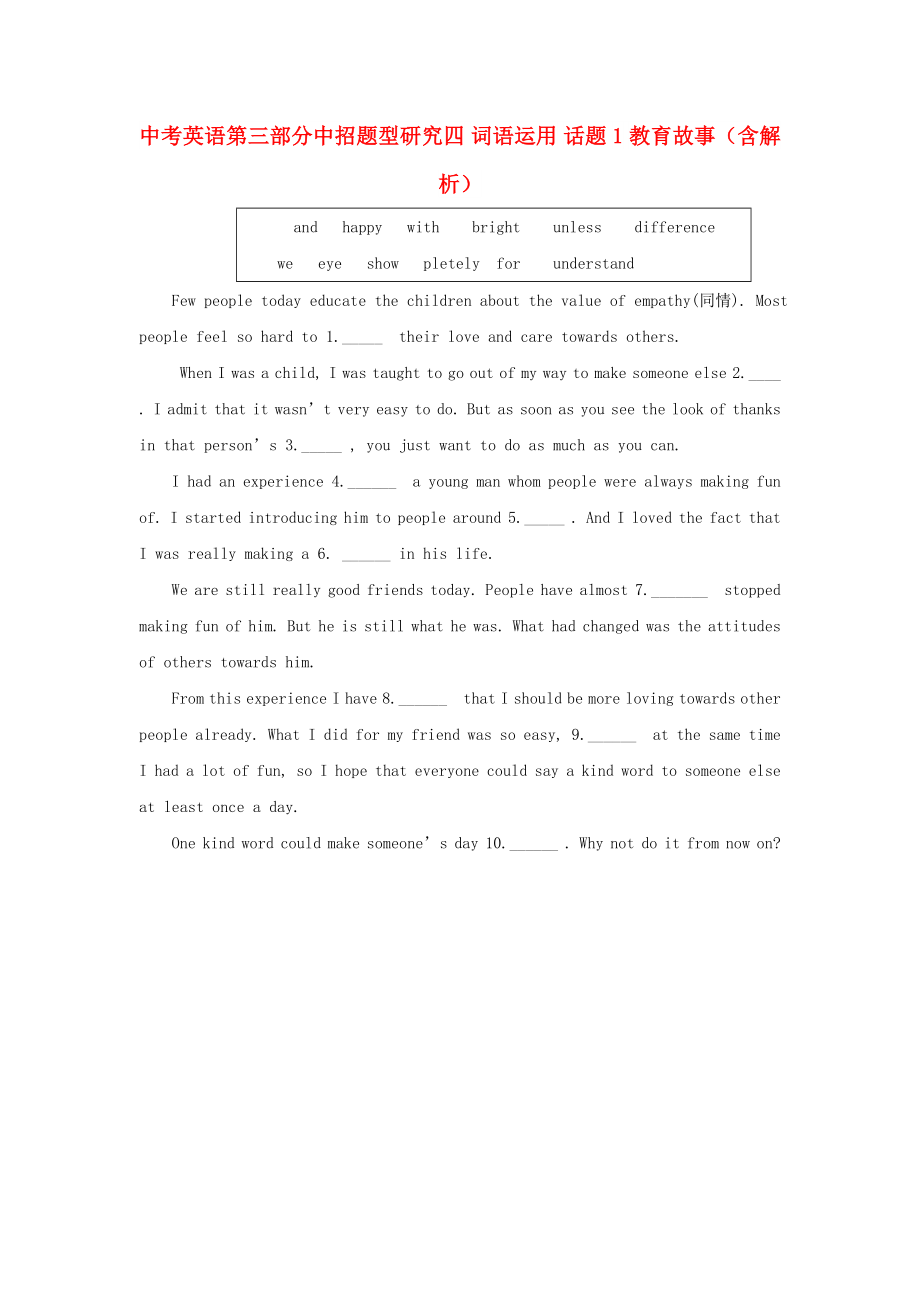《中考英語(yǔ)第三部分中招題型研究四 詞語(yǔ)運(yùn)用 話題1 教育故事(含解析)》由會(huì)員分享,可在線閱讀���,更多相關(guān)《中考英語(yǔ)第三部分中招題型研究四 詞語(yǔ)運(yùn)用 話題1 教育故事(含解析)(3頁(yè)珍藏版)》請(qǐng)?jiān)谘b配圖網(wǎng)上搜索�。
1��、中考英語(yǔ)第三部分中招題型研究四 詞語(yǔ)運(yùn)用 話題1 教育故事(含解析)
and happy with bright unless difference
we eye show pletely for understand
Few people today educate the children about the value of empathy(同情). Most people feel so hard to 1._____ their love and care towards others.
When I was a chil
2��、d, I was taught to go out of my way to make someone else 2.____ . I admit that it wasn’t very easy to do. But as soon as you see the look of thanks in that person’s 3._____ , you just want to do as much as you can.
I had an experience 4.______ a young man whom people were always making fun of. I s
3�����、tarted introducing him to people around 5._____ . And I loved the fact that I was really making a 6. ______ in his life.
We are still really good friends today. People have almost 7._______ stopped making fun of him. But he is still what he was. What had changed was the attitudes of others towards
4�、 him.
From this experience I have 8.______ that I should be more loving towards other people already. What I did for my friend was so easy, 9.______ at the same time I had a lot of fun, so I hope that everyone could say a kind word to someone else at least once a day.
One kind word could make so
5、meone’s day 10.______ . Why not do it from now on?
【主旨大意】本文是一篇記敘文�����。講述了在“我”小的時(shí)候媽媽教“我”用友好的語(yǔ)言對(duì)待別人及“我”幫助了一位總是被別人嘲弄的年輕人融入社會(huì),使大家慢慢接受他����,“我”也從中體會(huì)到幫助他人所獲得的樂(lè)趣。文章告訴我們:善意的語(yǔ)言會(huì)讓自己和他人的世界豁然開(kāi)朗��。
【詞匯分析】
and conj. 和��,同時(shí)��,并且
happy adj.高興的→happier(比較級(jí))→happiest(最高級(jí))→happily(副詞)→happiness(名詞)
with pre
6�����、p.和……一起
bright adj.明亮的→brighter(比較級(jí))→brightest(最高級(jí))→brightly(副詞)
unless conj. 除非
difference n.不同→different(形容詞)→differently(副詞)→be different from 與……不同
we pron. 我們→us(賓格)→our(形容詞性物主代詞)→ours(名詞性物主代詞) →ourselves(反身代詞)
eye n.眼睛→eyes(復(fù)數(shù))
show v.展現(xiàn) →showed(過(guò)去式)→shown(過(guò)去分詞)→showing(現(xiàn)在分詞/動(dòng)名詞)→to show
7�、(動(dòng)詞不定式)→shows(動(dòng)詞單三形式)→show sb. sth. 給某人展示某物→show off 炫耀
pletely adv.完全地
for prep. 為了
understand v.明白 →understood(過(guò)去式/過(guò)去分詞)→understanding(現(xiàn)在分詞/動(dòng)名詞)→understands(動(dòng)詞單三形式)
1. show【解析】根據(jù)句意:大多數(shù)人覺(jué)得向其他人表達(dá)他們的愛(ài)和關(guān)心是如此困難���。根據(jù)固定句型feel + adj. +to do sth.感覺(jué)做某事……���,可知填動(dòng)詞原形,故填show�����。
2. happy【解析】根據(jù)下文我媽媽告訴我每天至少對(duì)別人說(shuō)一種友好
8、的話�。所以媽媽教育我用自己的方式來(lái)使別人高興。make sb. adj.����,故填happy。
3. eyes【解析】根據(jù)句意:但是只要你從那個(gè)人的眼睛里看到感謝的目光����。根據(jù)短語(yǔ) in one’s eyes在某人眼中,故填eyes����。
4. with【解析】句意為:我和一個(gè)人們經(jīng)常取笑的年輕人有一段經(jīng)歷。和某人一起應(yīng)用介詞with�。
5. us【解析】根據(jù)本句中的“introducing him to people”可知是在我們周圍。又因?yàn)榉治鼍渥咏Y(jié)構(gòu)可知��,around是介詞�����,用we的賓格形式�����,故填us。
6. difference 【解析】句意:我很喜歡我在他的生活中產(chǎn)生了影響的事實(shí)�。ma
9、ke a difference為固定短語(yǔ)���,意為“有影響”��,故填difference��。
7. pletely 【解析】根據(jù)句意:人們近乎已經(jīng)完全停止取笑他了�?��?芍颂幈硎尽巴耆亍?��。分析句子結(jié)構(gòu)可知��,缺少副詞修飾動(dòng)詞stop�����,故填pletely����。
8. understood 【解析】句意為:從這次的經(jīng)歷中我已經(jīng)明白了,我應(yīng)該對(duì)他人更加友愛(ài)���。過(guò)去發(fā)生的事對(duì)現(xiàn)在造成的影響應(yīng)用現(xiàn)在完成時(shí)���,結(jié)構(gòu)為have+動(dòng)詞的過(guò)去分詞,故填understood���。
9. and【解析】句意為:我為朋友所做的很簡(jiǎn)單�����,而且同時(shí)我收獲了很多樂(lè)趣……可知前后半句之間為并列關(guān)系�,故填and���。
10. brighter【解析】根據(jù)句意:某一句友好的話能使人們的一天更歡快���。表示比較,應(yīng)用比較級(jí)����,故填brighter��。
 中考英語(yǔ)第三部分中招題型研究四 詞語(yǔ)運(yùn)用 話題1 教育故事(含解析)
中考英語(yǔ)第三部分中招題型研究四 詞語(yǔ)運(yùn)用 話題1 教育故事(含解析)

